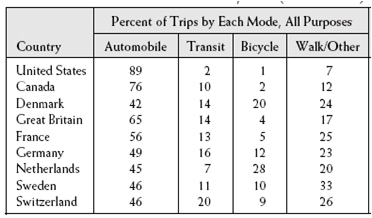I love reading Paul Krugman's The New York Times blog. His attempts to make sense of the world using hard economic data appeals to the "numbers guy" and "amateur economist" in me. While almost everything Prof. Krugman posts is noteworthy, I will share his comments on public transportation today.


Public transit accounts for only 4.7% of the transportation modes in the US. The more startling number is probably the 77.0% of the people who drive alone!! There is a lot of room for people to make sacrifices to carpool or use public transportation. It appears the rising cost of gas might push people to consider those options.
It is amazing how little most US cities have done to make public transportation a more feasible option. I think one of the major ways the US can minimize its dependence on oil is to invest more in urban public transportation infrastructure. The 2000 US Census shows that 58% of the US population is concentrated in urban areas with 200,000+ people. If that population starts using public transportation with regularity, the US could be much less dependent on oil.In case you’re wondering, I didn’t write about public transit for tomorrow. But I did some homework on the thought that I might, and might as well put it here. So here’s Exhibit A for the proposition that even in a nation with low overall population density, where the antelope roam and the skies are not [...]
We’re #1 OK, I knew that US public transit was pathetic compared with Western Europe; but if you try to talk about Europe, people start going on about population density, as if we all lived in Montana or something. Anyway, Canada has lots of open space, too — and it doesn’t even have $8 a gallon gas. [...]

Thanks to personal automobile accounting for 89% of the US transportation modes, the US, which constitutes 5% of the world's population, consumes 25% of the world's oil production. I envy the Dutch and Scandinavian lifestyle of riding bikes, walking, using windmills to generate power ...
The Times reports that ridership on mass transit is surging thanks to high gasoline prices. Good. But … as of 2005, only 4.7 percent of American workers took mass transit to work. So even a 10% surge in mass transit ridership would take only around half a percent of drivers off the road. The point isn’t that [...]

Public transit accounts for only 4.7% of the transportation modes in the US. The more startling number is probably the 77.0% of the people who drive alone!! There is a lot of room for people to make sacrifices to carpool or use public transportation. It appears the rising cost of gas might push people to consider those options.
Comments